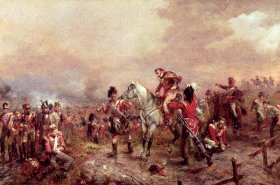|
|
William Carr Beresford and Arthur Wellesley, the future Duke of Wellington shared quite a few things, when the Peninsular Campaign started with the landing of a British Expeditionary Force at Mondego Bay on the 1st of August, 1808: They were born within a year of each other ( and what they should not know, they would also die at almost the same time), both belonged to the Anglo-Irish Ascendancy and they had seen service in India together. One could say, they knew each other well and had mutual esteem and even friedship for one another. But while Arthur was born in wedlock, William Carr was the illigitimate child of the 1st Marquess of Waterford and a laundress! This dark spot upon his birth should disturb and harass the distinguished soldier for long years until finally awarded a knighthood in 1811, after the victory of Bussaco, where he had greatly distinguished himself, both as a general officer and as a Marshal of the Portugese Army, who through laborious exactions had made a ramshackle assembly of men into a distinguished fighting force.
Beresford participated in his youth in Baird's expedition to Egypt and was present at the capture of the Cape in 1806. Captured and made a prisoner of war after the desperate expedition against Buenos Aires , he managed to escape back home in 1807. He was fluent in Portugese, factor that was decisive in his nomination to the head of the Portugese Army. Though his abilities as a field commander where somehow limited, he excelled in organisational and training matters and was extremly sucessful initiating the Portugese Cašadores, light troups which soon would become a most distinguished fighting body and highly appreciated by Wellington. Beresford commanded at Albuera (16th May 1811), the bloody battle fought almost in paralell but at some 400 miles distance with Wellington's engagement of Fuentes de O˝oro (5th May 1811). This battle revealed clearly his limited generalship. Nevertheless, he was highly appreciated by his Portugese soldiers and by Wellington himself, who was conscious of his associate's limited abilities, but never ever publicly critizised him. He was severely wounded at Salamanca, but still served in most of the later Peninsular actions with courage and distinction. At the close of the Peninsular War the long awaited recognition of Beresford, which had been so overshadowed by his illigitimacy, came: Created Baron Beresford of Albuera and Cappoquin, he was upgraded to a viscountcy in 1823.
When the outbreak of the Portugese Revolution of 1819 led to dismisal of British officers in Portugese service, William Carr refused to command in the Civil War. He returned back home, took roots in British politics and throughout his life remained a fervent supporter of Wellington, who appointed him -when Prime Minister in 1828 - Master-General of the Ordonance.
Beresford died on the 8th of January 1854 at his country estate at Bedgebury, Kent, having survived Wellington by two short years and being almost the last remainder of the glorious days of the Wars against Napoleon in a Victorian Great Britain, who's mindset and overall attitude had fully extinguished the cut of XVIII. Century creatures, such like hime and the Great Duke.
|
To begin with the end, Sir Thomas died at the day of Waterloo, killed by a French bullet that hit him through a not very military ramshackle tophat right into the head, while he led his troups - as always- foulmouthedly swearing and.......courageous! This excentric Welshman should have died already two days before at Quatre Bras: When an authopsy was performed on his mutilated body after the 18th June, the doctors found wounds from the engagement of the 16th of June which - untended - would have been severe enough to sent a draught horse to it's creator!
Commissioned in 1771, his advancement was slow, despite his worth as a regimental officer: Tom was a difficult man, uncompromising and stubborn. After living in frustrated retirement for twelwe years on his father's estate, he went finally as AdC to Sir John Vaughan to the West Indies, took part in the captures of St.Lucia, St.Vincente and Trinidad, where he served under Sir John Abercromby. He was then appointed governour of this island. He was promoted Brigadier-General in 1801. Some two years later he came under fire, having been accused of the use of torture against a female prisoner accused of theft. He was forced to return to England, where this case against him dragged on for five years until - in 1808 - the guilty verdict was finaly overturned. He participated in the infamous Walcheren Expedition which nearly ruined his health, before being given a divisional command under Wellington in the Peninsula.
Although Wellington never entrusted him with independant command, he considered him a superb ( but foulmouthed and bad-tempered, stubborn and difficult) subordinate and his 3rd Division was soon nicknamed 'The Fighting Division'. He especially distinguished himselve at Fuentes de O˝oro, Badajoz and Vitoria and received seven votes of thanks from the Commons (........but no peerage! The shadow of the torture affair of Trinidad still hung over him ). He was finally knighted in 1813 and promoted Lieutenant-General. Wellington convinced him with some difficulty out of his Welsh retirement to join him in Belgium. There Sir Thomas met his fate at the head of the 5th Division in a rough-and-ready advance.........very much his style!
You will meet this special favorite of mine all through my two Peninsula novels 'Adler und Leopard' und 'Der Herr des Krieges'.
 |
Pictures of Sir Rowland are scarce.......be paitient and wait until I find a nice one in uniform!
Sir Rowland Hill received his first commission in 1790. He distinguiseh himself with Abercrombie in Egypt and achieved the rank of full colonel early. During the Peninsular War he served as a brigade and then as divisional commander at Talavera. He contributed greatly to the success of the war by sweeping up the routed French force at Arroyo dos Molinos. When separated from Wellington at St. Pierre (1811), he successfully defied the attacks of Marshal Soult with 15000 men against Soult's 30000. His kindness to his troops encouraged loyalty and cooperation amongst his subordinate officers and earned him the nickname of "Daddy Hill". Wellington liked him for his extraordinary punctuality in obeying orders and because he lacked that restless ambition which makes men think more of the opportunities available to distinguish themselves than of carrying out orders.He was usually the one entrusted with a almost independent command, often the left flank of Wellington. His efficiency and performance became very visible at a moment, when he was not present, due to sickness and someone else took over his 'job': At Albuera, while 'Daddy Hill' recovered at hospital William Carr Beresford lead his troups -due to lack of initiative and coordination - almost to their loss. In 1825 Hill became a full general and served as Commander-in-Chief in England from 1828 until 1842.Throughout his life, he remained very close with the Duke.
 |
Lord Uxbridge wounded at Waterloo during the last stage of the battle
A brilliant handler of cavalry Henry PagetUxbridge began his career in the infantry! He transferred to the cavalry in 1795 and quickly made his regiment, the 7th Light Dragoons, one of the best regiments in the service. In 1808, he fought in Spain, winning brilliant cavalery victories at Sahagun and Benevente. One of his engagements, observed by Bonaparte, brought him high praise from the adversary for ingenious handling of troups and therewith saving Sir John Moore's retreat on La Coruna.Unfortunately, Henry was not only a bright officer but also a good-looking, cheerful womanizer. When he decided to elope with Wellington's sister-in-law (and got her pregnant, before returning her to a tearful husband only to elope for a second time, forcing a parliamentary divorce and then marrying the lady!!!!!!), the military establishment in London (wrongly) supposed that his talents were no longer required by Sir Arthur because of the scandal. During the following years he was Member of Parliament for Milbourne Port, and upon succeeding to his title in 1812 he sat in the House of Lords. In 1815 he was given the command of the Anglo-Allied cavalry (Fact on which Wellington commented: "He will not run with me!" The Duke who's own private life could be easily described as discreet, but nevertheless..........., was not a professional moralizer, but a professional soldier!). At Waterloo Henry was shot in the leg; the limb later had to be amputated on a kitchen table in the village of Waterloo (fact upon which Henry commented to his AdCs:"I have been a Beau for 46 years, now it's your turn to dance with the ladies!") Legend tells us, that upon seeing his shattered leg Henry remarked to Arthur, "By God, Sir, I've lost my leg." The Duke who was supporting him at the time looked down and remarked, "By God, Sir, so you have!", then he decided that Uxbridge was perhaps better with a surgeon and he himself with Maitland and the advance upon the Old Guard. In recognition of his services Uxbridge was created Marquis of Anglesey on 23rd June 1815. Fitted with an artificial limb he served as Lord-Lieutenant of Ireland (where he quarelled happily with Arthur!), and was promoted to field marshal in 1846. At the end of their lifes, Henry and Arthur, both remainders of an XVIII. century long gone bye, could be seen together, arm in arm, wandering around the Great Exhibition and the Cristal Palace, both stonedeaf and hurling into each others ears, while happily admiring the miracles of an aera to start, which none of them would ever understand.............
And
now a very personal remark on Henry: He was reputed to be the finest horseman in
Great Britain and he had a special artificial limb for equestrian feats! On the
coronation of Queen Victoria (when he was already 65 years old, he still managed
to leave the Hall of Banket on horseback, in very ceremonial style, without
showing his back to the yound queen and audience, as required by tradition. All
those of you who are riders, will admit with me, that this is not easy at
all.......................and while we are here already chatting horses: A word
in defence of Wellington's 'bad' seat: It was not, most certainly! But having
learned his trade at the French Riding Academy at Angers, it must have seemed
strange to British hunting fanatics, that Arthur could sit with straight back
and long stirrups on a spirited beast and still handle it correctly. Hail thee,
Franšois Robichon de la GuerinŔre, riding master of French kings! Thou hast
perpetrated thy craft right into the British Armed Forces..)